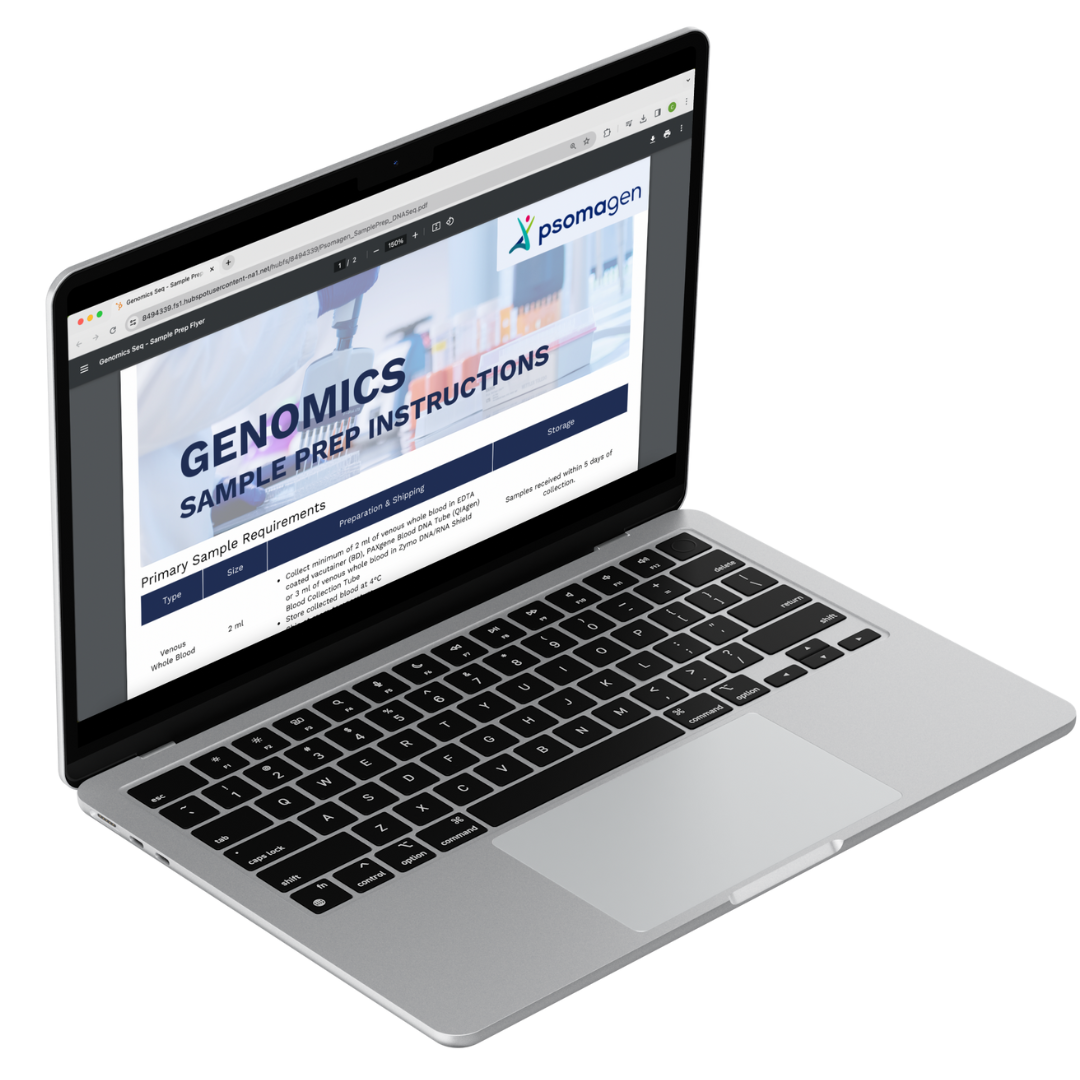Omics Research // Genomics
Whole-Genome Sequencing
Identify all changes within both coding and non-coding regions and chromosomal abnormalities in one quick and easy massively parallel next-generation sequencing workflow.
What Is Whole-Genome Sequencing?
Whole-genome sequencing (WGS) is the process of determining the order of bases (adenine, guanine, thymine, or cytosine) of all DNA in any living organism. WGS is the preferred method to identify chromosome abnormalities through copy number variations and other structural variations.
This can be achieved from a single sample using a single, massively parallel process known as next-generation sequencing (NGS). It is often used in discovery and exploratory studies, as well as in clinical applications.
Why Is Whole-Genome Sequencing Important?
The ability to characterize an entire organism’s genome offers possibilities in all fields of science. WGS aids research in infectious disease, microbiology, immunology, inherited disease, oncology, reproductive health, forensics, and more.
It can be used to identify new disease targets, diagnose inherited disorders, and help predict who will benefit from a given therapy.
Unsure what you're hoping to find? WGS gives you insight into genome-wide changes, offering the broadest range of coverage.
What Can You Do?
Process Both RUO and Clinical Samples
Access both research-use-only and CAP/CLIA services.
Get Analytics & Bioinformatics
Maximize insights with our dedicated bioinformatics team and numerous analysis options.
Offer Precision Medicine
Introduce new ways to prevent, diagnose, and treat disease on a personalized level.
Technologies Used for Whole-Genome Sequencing
Low-Pass Sequencing 
Best for
WGS at a lower sequencing depth, typically targeting 0.5-1X coverage of the genome; used in genome-wide association studies (GWAS), high-throughput population screening methods, and polygenic risk score calculation
Benefits
Simplified library preparation and reduced sequencing depth for reduced costs and a high-level, genome-wide screen
Clinical Whole-Genome Sequencing 
Best for
CLIA-certified, CAP-accredited assay validated to provide human genome-wide sequencing data for use with clinical samples
Benefits
High-quality library preparation with or without amplification, a 30X mean depth of coverage, and clinically relevant, annotated gene reports
On-Going Promotions
We're always adding new deals — check in often for updated promotions!

Whole-Genome Sequencing Best Practices
Sample Preparation & DNA Extraction
DNA extraction from blood, cultured cells, tissue, FFPE, saliva, and swab for research use
Blood, saliva, and gDNA are acceptable for For CLIA processing
Get your high-quality genomic DNA isolated from most sample types at Psomagen.
Sample Requirements
Flexible input depending on the library type
Short-Read Library
- 100-200ng with PCR-plus library, 500-1000ng with PCR-free library
- DNA concentration ≥ 20 ng/μl
- DIN ≥ 7.0 for non-FFPE, DIN ≥ 4.0 for FFPE
Long-Read Library
- 8.1ug of high molecular weight (HMW) gDNA for PacBio HiFi Library (avg. size 25K)
- DNA concentration ≥ 50 ng/μl
- DIN ≥ 8.0
Library Preparation
Short-Read Library
- TruSeq DNA Nano (350bp, 550bp)
- TruSeq DNA PCR-Free (350bp, 550bp)
- Nextera DNA flex library preparation
- KAPA library preparation
- SeqWell plexWell™ library prep
- Twist 96-Plex Library Prep
Long-Read Library
- PacBio HiFi Library
- PacBio SMRTbell Library
Sequencing Depth & Read Length
Short-Read Sequencing
- Instrumentation: Illumina NovaSeq 6000 or HiSeqX or NovaSeq X Plus
- 2 x 151 bp read length
- Custom sequencing coverage
Long-Read Sequencing
- Instrumentation: PacBio Sequel Ile
- Custom sequencing coverage
Bioinformatic Analysis
Basic analysis:
- Data quality control
- Mapping (ISAAC or BWA-GATK pipelines)
- Variant analysis (SNP/InDel)
Advanced analysis:
- Structural variant (SV)
- Copy number variation (CNV)
- Annotation and statistics
- Family trio analysis
- Insertion site prediction
- Joint genotyping
- Tumor-normal paired analysis
- Custom analysis
Data Delivery
All sequencing run data is delivered as demultiplexed .fastq files
When an entire flow cell or lane is purchased, raw data can be delivered as BCL files if requested at the time of purchase
Why Our Clients Choose Psomagen
Superior Data Quality
Exceeds manufacturer benchmarks
Fast Turnaround
Starting at one week for sequencing projects
US-Based Processing
Sequencing and customer support in Rockville, MD
Ph.D. Level Support
Expert assistance every step of the way, with real-time project updates through our online system
Automated Workflows
Increase scalability and improve reproducibility
CLIA-Certified, CAP-Accredited Labs
Clinical research options available (inquire for more information)
Complete Sequencing Solutions
From extraction to data analysis, with many sample types accepted
Quotes From Our Clients
Being able to generate my own libraries and submit them as a single pool without having to pay for individual sample QC (just 1 QC for the pool I create), let us go from sequencing dozens of samples to 100s of samples and still save $1,000s compared to on campus facilities. That we get the results back faster than we do for on campus work is just icing on the cake.
Zhijun Duan
University of Washington
The NGS services in Psomagen Inc are high-quality, cost-effective and often with quick turn-around-time! People in Psomagen are also very responsive!
Ken Mills
Holy Cross
We're Ready for Your Order!
Here's what to expect in your project's life cycle. If you have a question during sequencing, it's easy to get in touch!
01
Request a Consultation
Create an account through our client portal and get in touch with your local field team to start designing a project.
We’ll help drive your research forward with the right tools for your research needs.
02
Place an Order
After finalizing the scope of work, the official quote will be issued for signing. Then, your sales representative will send specific shipping instructions.
Once all the samples and necessary documents are ready, we can start your project. Need more analysis? Reach out to our bioinformatics experts to dig deeper.
03
QC and Data Delivery
All Psomagen sequencing projects come with a built-in QC step to ensure you get the information you need. An account manager will update you on your project's progress in a timely manner.
You can also see some project information and securely view all valid reports on the client portal site.
WGS in Action
WGS Is Only the Beginning
While WGS is the most comprehensive approach, you may have cost concerns or a very specific question. Ask about our full list of other NGS methods and get exactly what you need.



